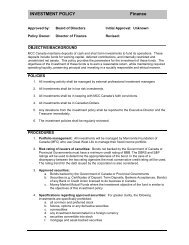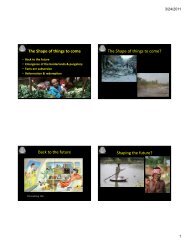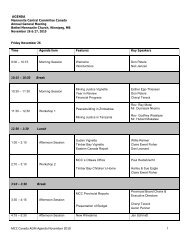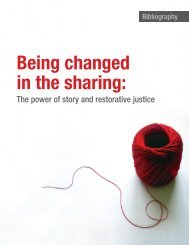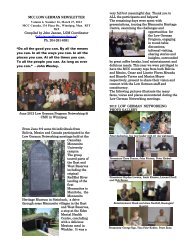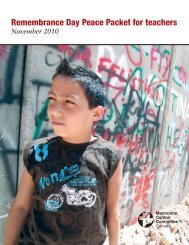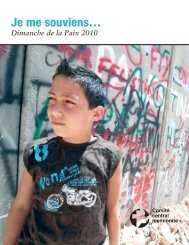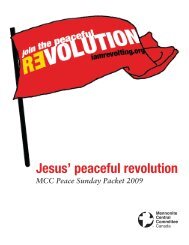Walking together: Healing and hope for Colombian refugees
Walking together: Healing and hope for Colombian refugees
Walking together: Healing and hope for Colombian refugees
Create successful ePaper yourself
Turn your PDF publications into a flip-book with our unique Google optimized e-Paper software.
w a l k i n g<br />
t o g e t h e r<br />
29<br />
Family <strong>and</strong> gender roles change. Often it is the women of the family that are able to find work, since the<br />
rural skills many men have are not applicable to cities, <strong>and</strong> so the women become the breadwinners<br />
of the families while the men suffer unemployment <strong>and</strong> plummeting self esteem, unable to provide <strong>for</strong><br />
their children <strong>and</strong> families.<br />
Identity as a Refugee in Canada:<br />
“It is like you are reborn, you have to start all over again.” - Mario<br />
Once refugee families reach Canada, they undergo another identity change. In Canada, they become<br />
visible ethnic minorities, they are labeled as “<strong>refugees</strong>,” “immigrants,” “newcomers” or even “<strong>for</strong>eigners.”<br />
Their accent <strong>and</strong> difficulties speaking <strong>and</strong> underst<strong>and</strong>ing the new language gives them away as such.<br />
If they were professional in their life be<strong>for</strong>e displacement, it is unlikely that they will be able to practice<br />
their profession in Canada. They will enter the work <strong>for</strong>ce as blue collar workers, <strong>and</strong> may experience<br />
demeaning treatment - or simply being ignored - in their workplace. Navigating their new city - not<br />
just streets <strong>and</strong> bus routes, but also shopping, banking, health care <strong>and</strong> education systems - can be<br />
overwhelming. Everything is <strong>for</strong>eign; the refugee is no longer in familiar territory <strong>and</strong> can feel impotent<br />
<strong>and</strong> helpless. As refugee children’s language skills quickly overtake those of their parents, the children<br />
in refugee families start to take on parenting roles - interpreting <strong>for</strong> their parents the new world around<br />
them <strong>and</strong> even making decisions that would have previously fallen to the parents to make. This new<br />
series of role-reversals <strong>and</strong> identity-shifts can be painful <strong>and</strong> confusing <strong>for</strong> refugee families <strong>and</strong> may be<br />
one of the main reasons why many refugee families struggle to stay <strong>together</strong> once they begin their new<br />
life in Canada.<br />
CHURCH AND IDENTITY<br />
“To be rooted is perhaps the most important <strong>and</strong> least recognized need of the human soul” 8 - Simone Weil<br />
“One’s roots are in Colombia, but without freedom we were becoming like a dry tree about to die, <strong>and</strong> in<br />
Canada we <strong>hope</strong> to be fertilized, recuperate <strong>and</strong> give fruit.” - José<br />
Refugees are uprooted people. In their process of establishing new roots in Canada, <strong>for</strong>ming a new,<br />
positive identity is crucially important. Identity is not <strong>for</strong>med in a vacuum but in the context of the new<br />
community. The sponsoring church community is an invaluable asset <strong>for</strong> sponsored refugee families<br />
in their process of <strong>for</strong>ming new, healthy identities in Canada. What better place <strong>for</strong> a refugee family to<br />
establish roots than in their new church community?<br />
Far from the community they left behind, <strong>refugees</strong> are at risk of feeling unneeded, out of place <strong>and</strong><br />
unimportant in their new context. By finding ways that <strong>refugees</strong> can begin to participate, serve <strong>and</strong><br />
<strong>for</strong>m friendships within the church community, the church can help <strong>refugees</strong> find new meaning <strong>and</strong><br />
a new sense of belonging. For persons who have survived years of being told they are useless <strong>and</strong><br />
8. Weil, S. (1952) The Need <strong>for</strong> Roots. London: Routledge



